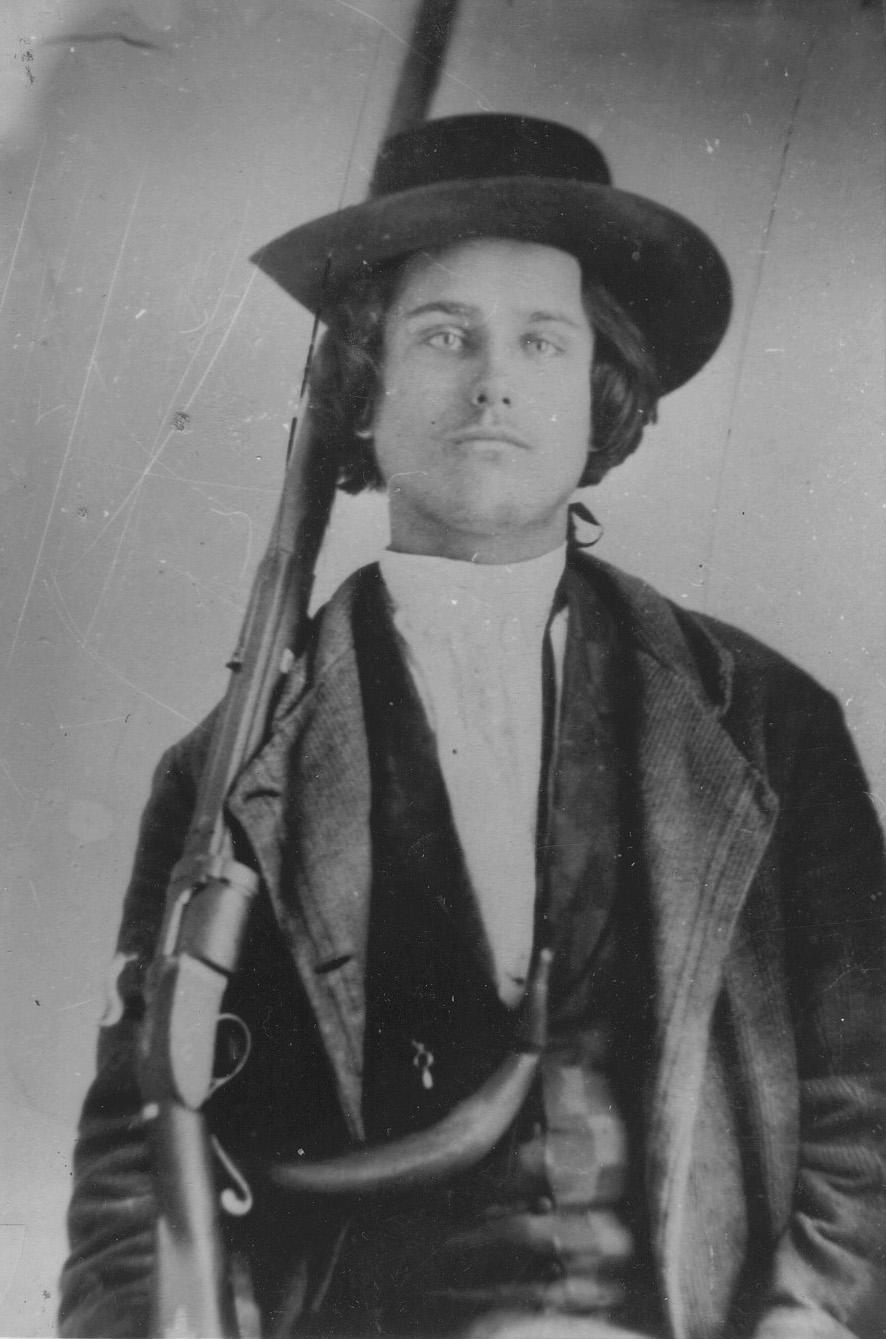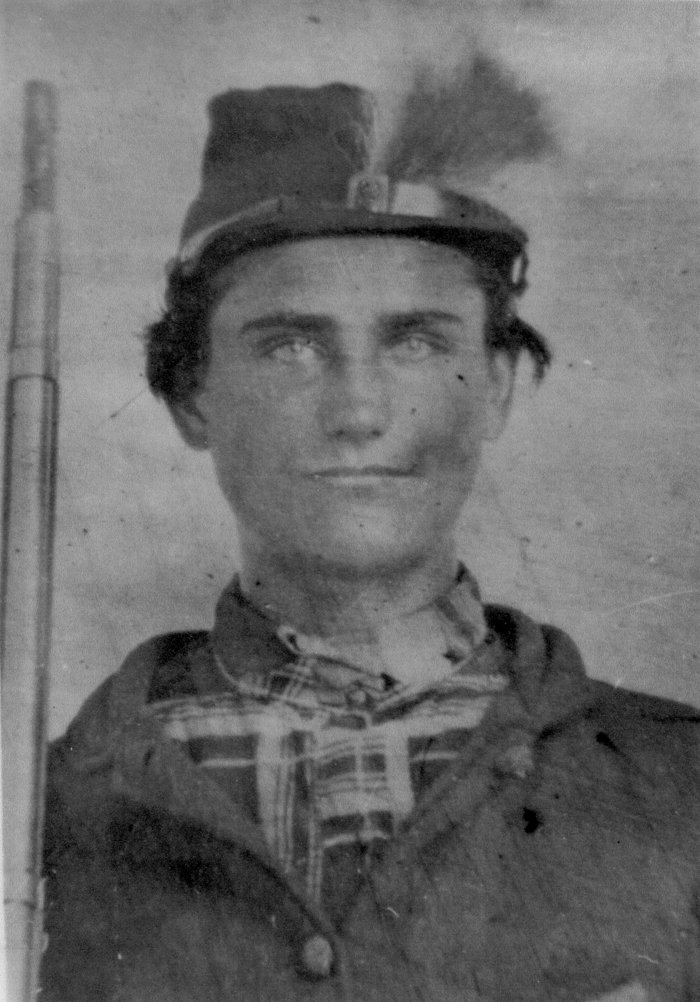Shortly after the attack on Fort Sumter, he informed his friends that he would be joining the army to fight for the Union. With that in mind, he traveled to Harrisburg to enlist, although his military records claim he enlisted in McKean County. He enlisted on May 3, 1861, and mustered into state service May 30 as a private with Co. I of what would be known variously as the 1st Pennsylvania Rifles, Kane Rifle Regiment, 13th Pennsylvania Reserves, and the 42nd Pennsylvania Infantry. Most famously by their nickname "The Bucktails" for the strips of deer hide each man wore in their hats. Angelo was instrumental in supplying many of those deer hides via his friend Laroy Lyman, mentor, hunter extraordinaire, and devoted follower of John Crapsey's religious practices. The regiment never formally mustered into federal service and for that reason was in danger of disintegrating when they stood for their first federal pay muster latter that year, but remain in the army they did. Angelo saw his first action at the battle of Dranesville, then Cross Keys and Antietam. He fell captive at the battle of Fredericksburg on the Union left. Official records erroneously claim he was also wounded and some even misidentify him as "M. Crapsey Angels." The man who emerged from Libby Prison a weeks later was a shell of his former exuberant self. Depression, self-consciousness, and delusions of lice infestations consumed his every waking moment. Duty called and Angelo had one more battle before him - Gettysburg. He survived unscathed and even expressed pride over the regiment's behavior there, but he fell deathly ill with a fever that exacerbated a mental condition we now recognize as post-traumatic stress disorder. After a furlough home for a recovery that never happened, he returned to Chestnut Hill (Mowrer) U.S. Hospital in Philadelphia and finally received his discharge by surgeon's certificate to date October 13, 1864.
The exit from the army did nothing to ease the pain, and he fell deeper into mental instability. Several aborted attempts at suicide followed. During some, he threatened friends and family who happened to be nearby. In between times, he suffered bouts of crushing depression and soon was shunned by all who knew him. When long time friends denied him permission to join them on a hunting party, he snatched one of Laroy Lyman's rifles from a supposedly secret location and carried it to a quiet spot along the Allegheny River near the Lyman house. There, he leaned his back against a tree, put the barrel into his mouth, and pushed the trigger with a forked stick. His final attempt at suicide gruesomely succeeded.
His story is chronicled in Dennis W. Brandt: Pathway to Hell: A Tragedy of the American Civil War and was featured on the HBO special War Torn for which Brandt served as historical consultant.
Shortly after the attack on Fort Sumter, he informed his friends that he would be joining the army to fight for the Union. With that in mind, he traveled to Harrisburg to enlist, although his military records claim he enlisted in McKean County. He enlisted on May 3, 1861, and mustered into state service May 30 as a private with Co. I of what would be known variously as the 1st Pennsylvania Rifles, Kane Rifle Regiment, 13th Pennsylvania Reserves, and the 42nd Pennsylvania Infantry. Most famously by their nickname "The Bucktails" for the strips of deer hide each man wore in their hats. Angelo was instrumental in supplying many of those deer hides via his friend Laroy Lyman, mentor, hunter extraordinaire, and devoted follower of John Crapsey's religious practices. The regiment never formally mustered into federal service and for that reason was in danger of disintegrating when they stood for their first federal pay muster latter that year, but remain in the army they did. Angelo saw his first action at the battle of Dranesville, then Cross Keys and Antietam. He fell captive at the battle of Fredericksburg on the Union left. Official records erroneously claim he was also wounded and some even misidentify him as "M. Crapsey Angels." The man who emerged from Libby Prison a weeks later was a shell of his former exuberant self. Depression, self-consciousness, and delusions of lice infestations consumed his every waking moment. Duty called and Angelo had one more battle before him - Gettysburg. He survived unscathed and even expressed pride over the regiment's behavior there, but he fell deathly ill with a fever that exacerbated a mental condition we now recognize as post-traumatic stress disorder. After a furlough home for a recovery that never happened, he returned to Chestnut Hill (Mowrer) U.S. Hospital in Philadelphia and finally received his discharge by surgeon's certificate to date October 13, 1864.
The exit from the army did nothing to ease the pain, and he fell deeper into mental instability. Several aborted attempts at suicide followed. During some, he threatened friends and family who happened to be nearby. In between times, he suffered bouts of crushing depression and soon was shunned by all who knew him. When long time friends denied him permission to join them on a hunting party, he snatched one of Laroy Lyman's rifles from a supposedly secret location and carried it to a quiet spot along the Allegheny River near the Lyman house. There, he leaned his back against a tree, put the barrel into his mouth, and pushed the trigger with a forked stick. His final attempt at suicide gruesomely succeeded.
His story is chronicled in Dennis W. Brandt: Pathway to Hell: A Tragedy of the American Civil War and was featured on the HBO special War Torn for which Brandt served as historical consultant.









